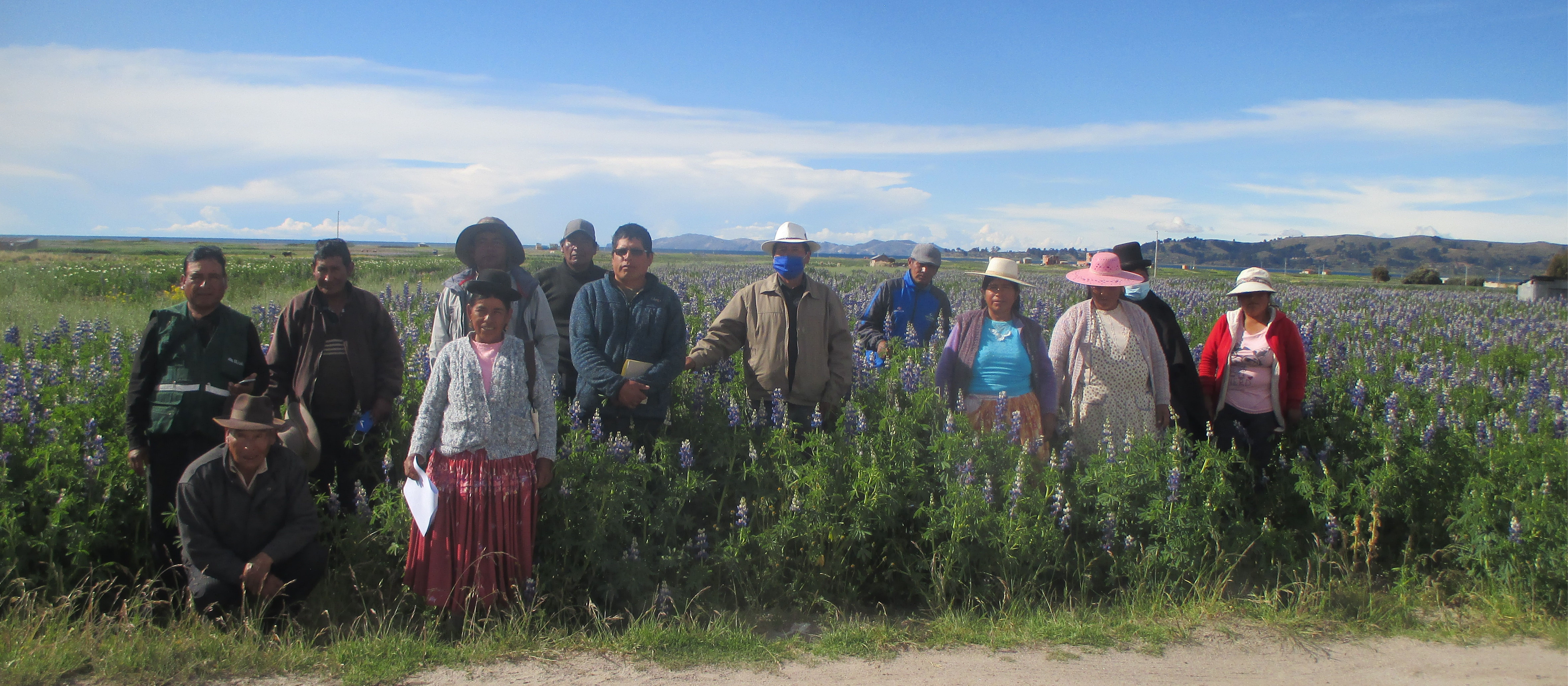The Resilient Heritage of the Andes Cañahua and Tarwi project is part of the EUROCLIMA+ programme in the Resilient Food Production sector,
funded by the European Union and implemented by Swisscontact, Proinpa and Chuyma Aru. The project increases the resilience of rural farming production systems in the Altiplano and Bolivia, strengthening the cañahua and tarwi production complexes by improving the production, marketing and consumption of the superfoods that are part of the countries' food heritage.
Cañahua and Tarwi crop cultivation is based on ancestral knowledge and these are the basis of agriculture for many families in the Bolivian and Peruvian Altiplano. However, both crops had been considered forgotten, given their low production, value and consumption, in addition to the vulnerability of the Bolivian and Peruvian altiplano ecosystems to the effects of climate change.
View the closing video of the project
Results
Around 720 resilient Cañahua and Tarwi producing families in Bolivia and Peru increased their crop yields by expanding the genetic base and best agricultural practices to reduce their vulnerability and 2774 people were trained to confront the effects of climate change, improving their resilience capacities promoted by the project Promoting the Heritage of Our Ancestors: Resilient Production, Marketing of Cañahua and Tarwi as part of the Euroclima+ actions.
The project is implemented in 4 municipalities in Bolivia; Jesús de Machaca, Acasio, Anzaldo and Caquiaviri; and in 2 municipalities in Peru; Zepita and Yunguyo where 1,504 families received resilient seed in the 2019 to 2021 campaigns, plus 7 tonnes of resilient seed delivered in two agricultural campaigns, 304 hectares sown with Cañahua and Tarwi in the two agricultural campaigns. 304 hectares were planted with Cañahua and Tarwi in the two agricultural campaigns, benefiting 613 families who increased their yields of Cañahua and Tarwi crops by more than 10%.
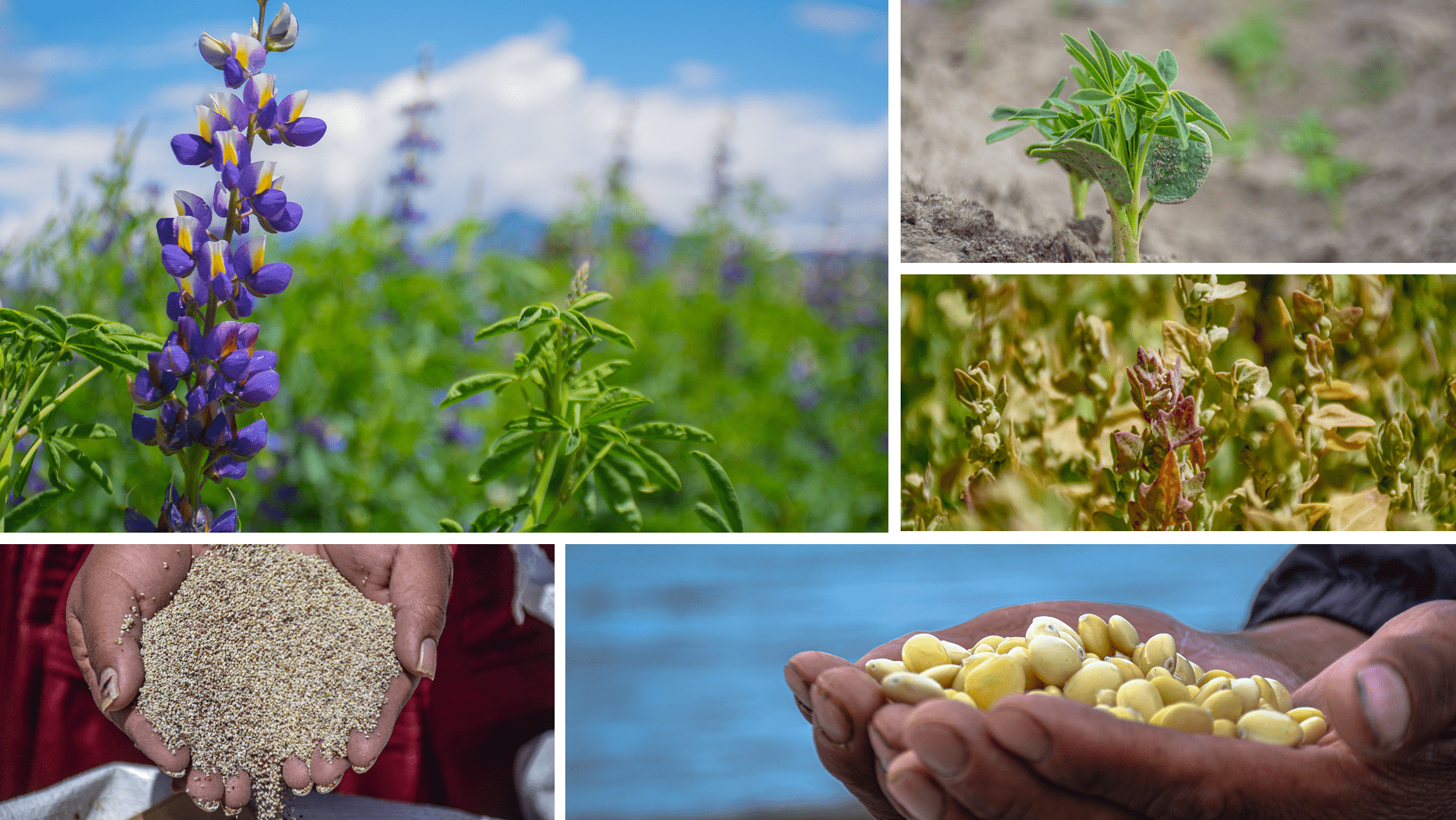 |
Cañahua and Tarwi plants and processing into grains
In Bolivia, at least 10 Best Agricultural Practices were disseminated, and in Peru, breeding workshops, which have allowed families to adapt to climate change through training and technical assistance to help improve their resilience. The 41 workshops held on diversified use promoted greater family consumption. Three varieties of resilient Cañahua and two varieties of Tarwi were registered.
Testimonies
The project was able to contribute to improving the quality of life of Cañahua and Tarwi producers in Bolivian and Peruvian municipalities, some of whom commented on their perceptions of the change they have perceived since the project's support for their crops, sowing and harvesting.
Javier Laime has been a cañahua producer for as long as he can remember, like his parents and grandparents in the Jesús de Machaca municipality in the department of La Paz, Bolivia at 3,600 metres above sea level. He is grateful to the project for the opportunities to strengthen, increase and promote the production of the Apachi association with 25 affiliated families. He says that the varieties of cañahua seeds (Lasta rosada, cañahuiri) have given good results in terms of resistance to frost, hailstorms and drought, as well as short ripening times.
"We are happy with the Euroclima project for the provision of cañahua seeds to improve production, these varieties have given good results, as well as the training in best agricultural practices and the traps for insects that were damaging the harvest. Organic agricultural management is a good way to protect the environment by putting into practice the ancestral knowledge of our grandparents. This year we have been able to harvest approximately 500 quintals of cañahua, 20% for our own consumption and with the support of Swisscontact and Proinpa we have signed a two-year agreement with Granja Samiri to sell cañahua.”
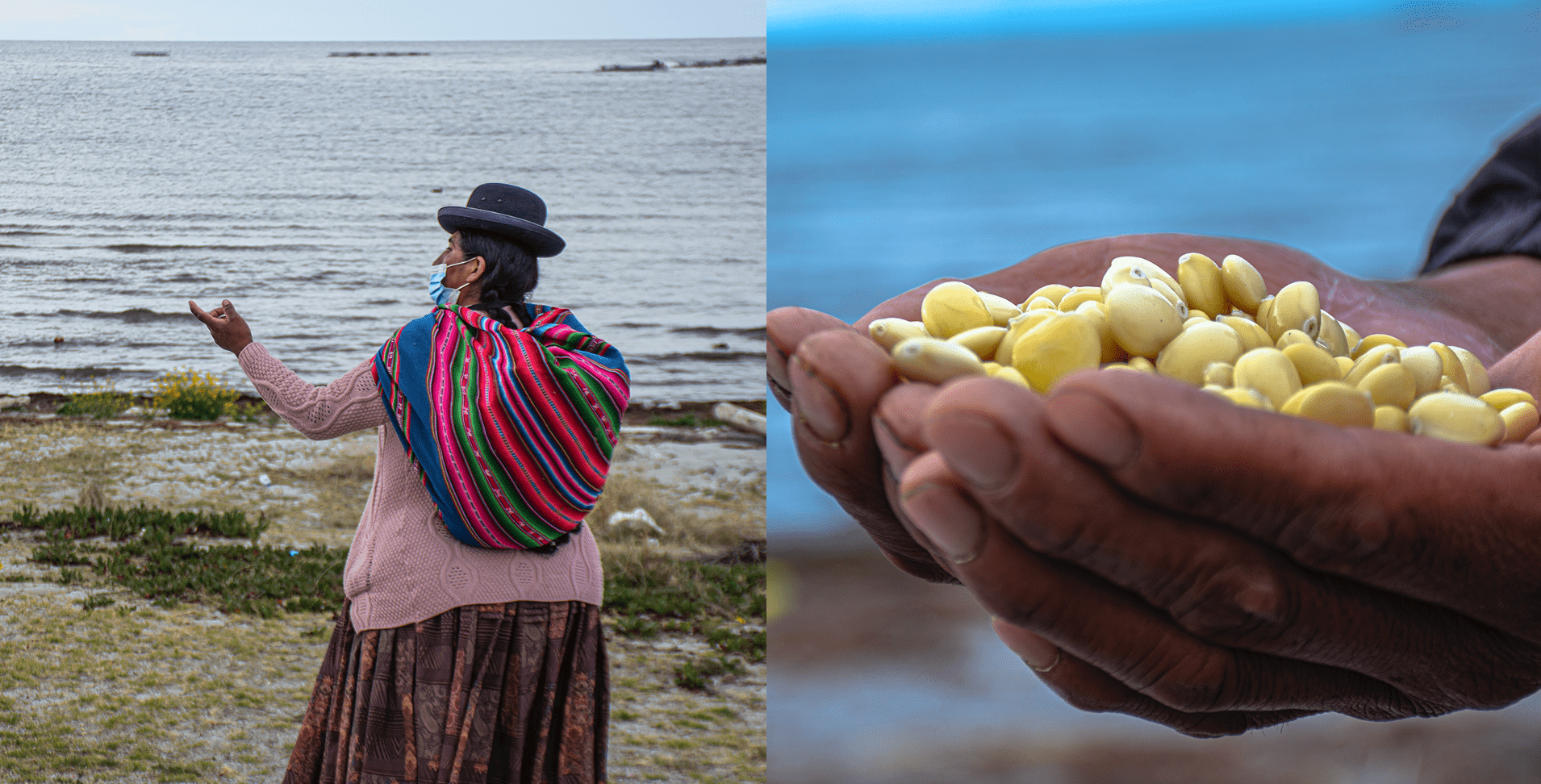 |
Producer on Lake Titicaca Yunguyo (Peru)
In this regard, producers from the APECAJJA and APACHI associations in the Jesús de Machaca municipality celebrated the signing of a two-year agreement to supply cañahua to the Granja Samiri company. This strategic commercial alliance between Granja Samiri and the producers promotes long-term sustainability, production and best agricultural practices promoted by the project Resilient Heritage of the Andes, Cañahua and Tarwi.
For her part, Eng. Trigidia, general manager of the Samiri Farm expressed her enthusiasm for the strategic commercial alliance with the associations "We have been able to consolidate this commercial strategy with the purchase of cañahua seeds from the producer to the processor at a fair price. As Samiri Farm we want to strengthen the producers to generate a boost in the production of cañahua, today we are bringing 120 quintals of very high quality cañahua and we hope that in the coming years this figure will be higher. Granja Samiri is in charge of transforming the cañahua into bars, pito, pipocas, biscuits and other products for the national market, promoting the consumption of cañahua."
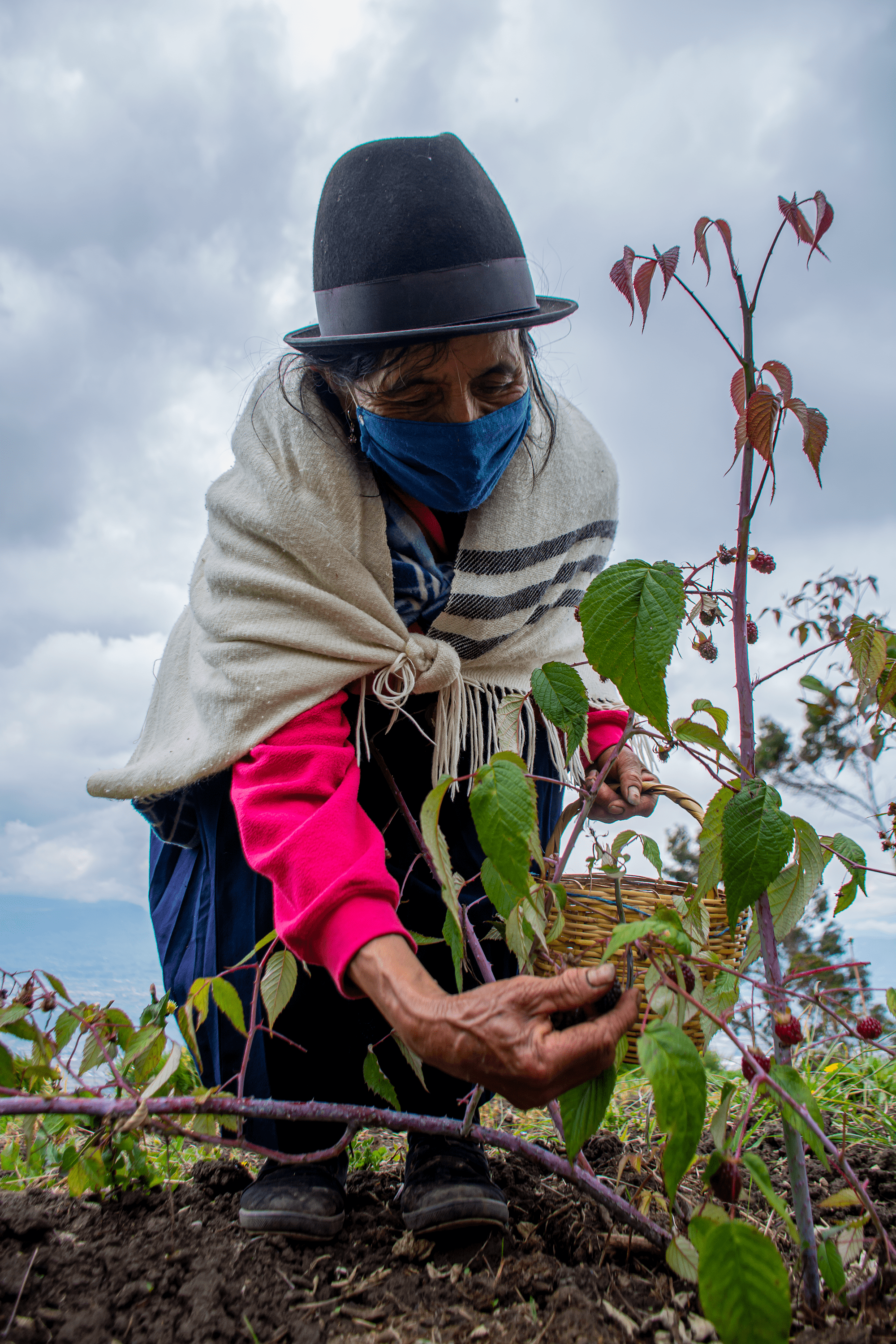 |
Resilient and agroecological production in the province of latacunga
Andes trópico is also a medium-sized company that transforms cañahua, a beneficiary of the project. Raquel Olivera, the owner manager, comments "The Euroclima project has supported us with equipment for production and training in business plans, this has allowed us to increase the production of processed cañahua products and now we have biscuits, bars, cañahua cereals, I believe that in the not too distant future this super food will reach all of Bolivia and certainly also other countries."
Norka Ojeda is the legal representative of the Panaseri company that transforms tarwi into food products in Cochabamba Bolivia, "We process tarwi grains for the production of mote, commonly known as chuchusmuti, a product that is marketed under the name TARWIX, and with the project we have strengthened our value chain, increased the variety of products and this allows the Tarwi to be positioned in the market and the producer families generate a decent income while increasing their production. With the support of the project, Panaseri has innovated in its production, such as the production of the Fortitarwix bar, which includes cañahua and tarwi among its ingredients, which has allowed it to reach a nutritional value of 41% protein.”
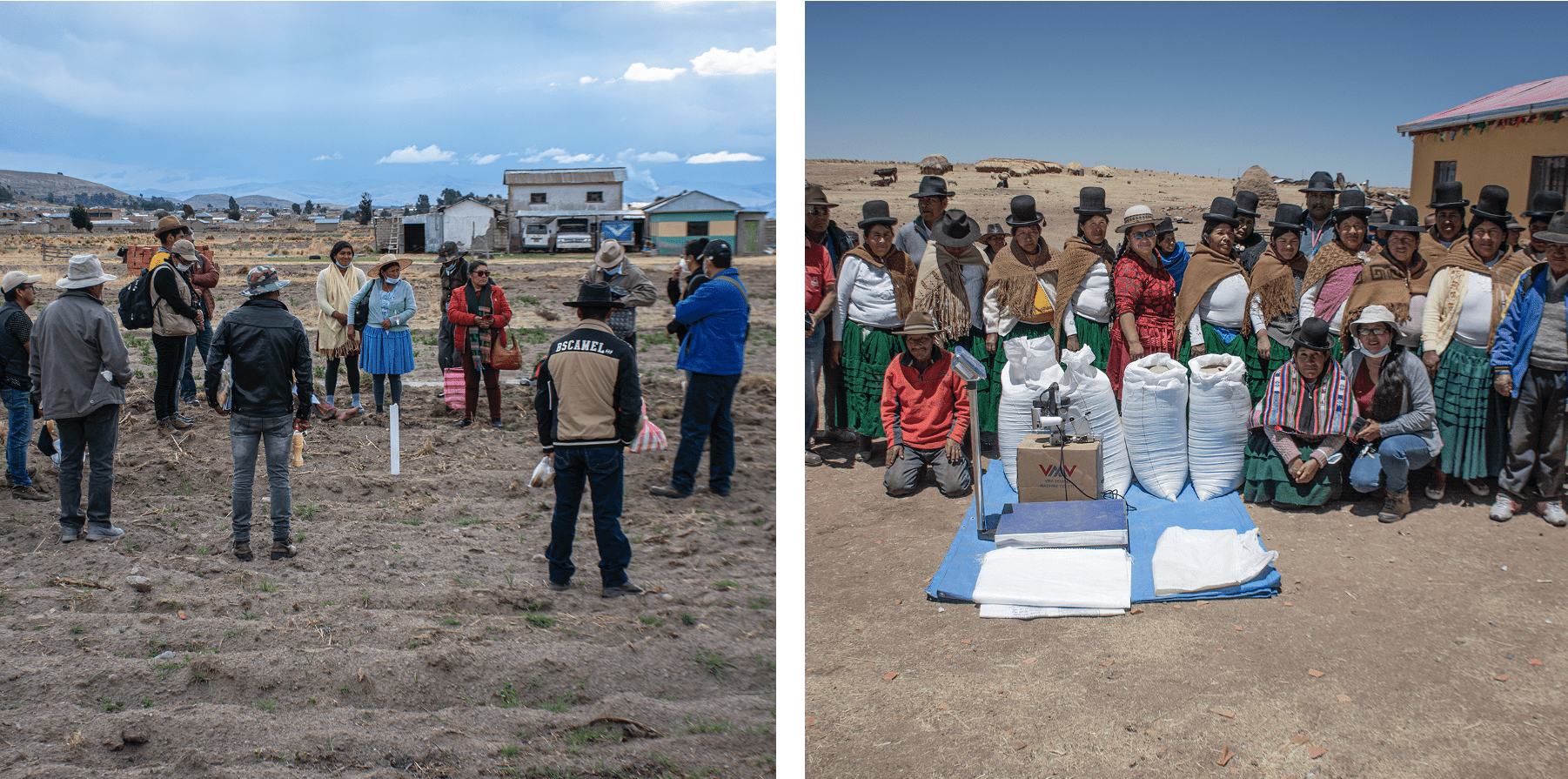 |
Field visit between producers of Cañahua and Tarwi in Perú and sale of cañahua to the Samiri farm for the production of processed products -
jesús de machaca municipality
For his part, the coordinator of the Resilient Heritage of the Andes, Cañahua and Tarwi project, Martín Morales, explains that the project is part of the Resilient Food Production component that covers 4 municipalities in Bolivia and 2 in Peru. "This year we have exceeded our goal of reaching 1200 beneficiary families with the provision of seeds, best agricultural practices, equipment for environmentally friendly and resilient sowing and harvesting, rescuing ancestral teachings of production. With the project we were able to link the production of the beneficiaries with the industries through purchase and sale agreements, we supported the industry in the promotion and innovation of cañahua and tarwi products with the aim of positioning these superfoods in the market and guaranteeing the food security of the Bolivian and Peruvian population".
The expertise of Swisscontact and the partners with whom they are implementing the project has led to the development of different sustainability actions, such as the Municipal Regulations, which aim to generate new strategies through the municipalities to support producer families in primary production. Similarly, the industries that have benefited from the business plan developed and training provided by the project can implement product innovation actions and generate agreements with producer families, so that the industry-producer relationship is permanent.
Among the relevant sustainability actions, the project has supported the development of the Andean Grains programme in Bolivia, reinforced by the enactment of a Supreme Decree, which guarantees that the actions developed as a pilot project will be scaled up and will reach many more producer families and municipalities.
About the project "Resilient Heritage of the Andes Cañahua and Tarwi".
The project "Resilient Heritage of the Andes Cañahua and Tarwi" promotes the resilience of rural farming production systems in the Bolivian and Peruvian Altiplano, strengthening the Cañahua and Tarwi production complexes by improving the production, marketing and consumption of superfoods that are part of the food heritage of both countries, benefiting 1200 producer families. The project also developed the green solution Quechua and Aymara communities implement technological and ancestral solutions in the cultivation of Cañahua and Tarwi in the Andes of Bolivia and Peru.
More information
Pablo Jesús Rossendy Roja, Communicator of the EUROCLIMA+ Project - " Resilient Heritage of the Andes, Cañahua and Tarwi", This email address is being protected from spambots. You need JavaScript enabled to view it.
Resilient Food Production sector, This email address is being protected from spambots. You need JavaScript enabled to view it.

